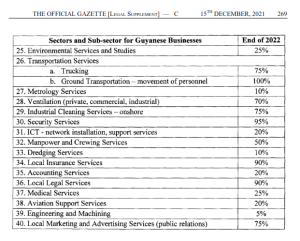Home News Proposals cater for 20% to 100% utilisation of Guyanese businesses in 40...
– Secretariat to be established to manage rooster of Guyanese, local goods and services providers
After weeks of widespread consultations with stakeholders, the government tabled the much-anticipated Local Content legislation that outlines the requirements of foreign companies operating in the petroleum sector to invest in or utilise the goods and services provided by Guyanese and Guyanese-owned businesses.
The Local Content Bill seeks to provide for the implementation of local content obligations on persons engaged in petroleum operations or related activities in the petroleum sector. It will prioritise Guyanese nationals and Guyanese businesses in the procurement of goods and services for the enhancement of the value chain of the petroleum sector as well as enable local capacity development.
Additionally, the proposed legislation will also provide for the investigation, supervision, coordination, monitoring, and evaluation of and participation in local content in Guyana; and promote competitiveness and encourage the creation of related industries that will sustain the social and economic development of Guyana. 

This was explained by Natural Resource Minister, Vickram Bharrat, when he tabled the Bill in the National Assembly on Thursday. The proposed legislation requires all companies operating in the petroleum sector to implement local content as an essential component of their operations.
Among the proposals in the Bill is the requirement of foreign companies to engage Guyanese and Guyanese-owned businesses, at specified and varying levels, in at least 40 areas by the end of 2022.
The Bill describes a Guyanese company or business as one that is owned by a Guyanese national who exercises, individually or jointly, voting rights representing at least 51 per cent of total shares, and with Guyanese holding at least 75 per cent of executive and senior management positions as well as 90 per cent of non-managerial and other positions.
These include 100 per cent exclusive use of Guyanese companies in the provision of immigration support services, work permits, visa applications, visa on arrival, in-water activity permit, custom brokerage services, and ground transportation.
According to the document, this is to ensure “maximum participation of Guyanese nationals and Guyanese companies supplying goods or providing services in the Guyanese petroleum sector; and local capacity development.”
The utilisation of goods and services in other areas, which ranges from catering services to environmental services and studies, are covered between 20 to 95 per cent.
However, the Bill states that the subject Minister can waive these requirements in certain instances such as if a petroleum operation is deemed of national interest and there is a lack of local capacity.
Moreover, the proposed legislation also caters for the establishment of a Local Content Secretariat that will keep a Local Content Register of “qualified” Guyanese nationals for employment as well as of Guyanese and Guyanese businesses from which goods and services can be procured.
This Secretariat will consist of “a director and such other members… amongst persons who are qualified for appointment to the Secretariat by reason of their integrity, and experience, professional capacity, and requisite qualification relating to the work of the Secretariat.”
Other functions of the Local Content Secretariat includes developing and maintaining measures for the effective implementation of local content by companies; developing and implementing strategies that will give preference to, or ensure equal treatment of Guyanese and Guyanese-owned businesses; conducting market analysis; developing guidelines such as for local content reporting, procurement, bid evaluation, training, research and development, partnership and joint ventures, and financial and insurance services, and undertaking public education and awareness campaigns among other tasks.
Qualified citizens and locally-owned businesses will have to apply for and obtain a certificate of registration to be included in the Local Content Registry. That certificate will have to be updated every year on the date of issuance.
As it relates to penalties, false declarations to get on the registry, or changes to citizenships, or changes in the company’s ownership status that are not indicated to the Secretariat, will carry a fine of $1 million for individuals and for companies, $5 million. They will also be removed from the Local Content Register.
In addition, all companies operating in the petroleum sector are required to submit a five-year local content master plan within four months of this Act being passed or within four months of being licensed to operate. The subject minister is tasked with approving or refusing, this plan after consultations with the Secretariat.
The Local Content Bill also proposes for the Secretariat to monitor and compile a report of the operations of all companies in the petroleum sector as it relates to their compliance, or lack of, with the provisions set of in the Act. That report will be presented to the subject minister who will then table it in the National Assembly.
Additionally, a five-member Inter-Agency Committee is expected to be set to support the Secretariat in carrying out its mandate and will act in an advisory capacity.
Upon assuming office in August 2020, the PPP/C Administration embarked on a fresh round of consultations aimed at developing a proper Local Content Policy.
In fact, a Local Content Advisory panel was established by President Dr Irfaan Ali, and this body hosted several consultations with stakeholders.
President Dr Irfaan Ali on Wednesday said the Local Content Bill will be “transitional and transactional”. He noted that the bill will ensure “that there is enough scope through a legislative framework that incentivises investment from the local private sector” and enables them to be an important party to the development of the oil and gas sector.
Earlier this week, Vice President Dr Bharrat Jagdeo had led a team that engaged civil society on the final consultation of the draft Local Content Policy before its presentation in the National Assembly.
Following that meeting, President of the Georgetown Chamber of Commerce and Industry (GCCI) Timothy Tucker described the exercise as a success. The GCCI Head also noted that the complete local content document is expected to be shared with stakeholders.

